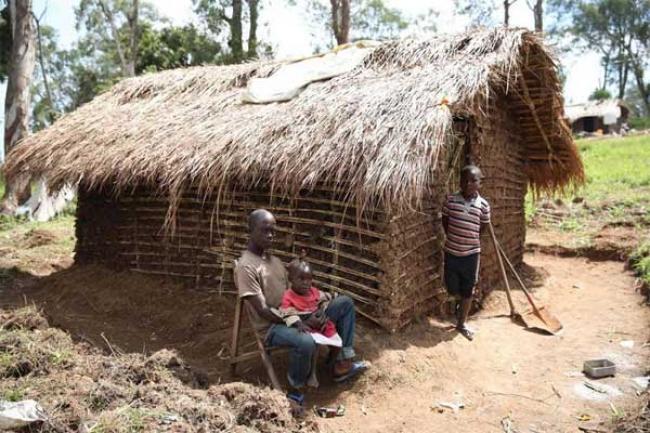Just Earth News 22 Mar 2016

UN Photo/Abel Kavanagh
“While we often focus on political, security and humanitarian issues as we discuss conflict prevention and resolution, we should remind ourselves that peace and security go hand-in-hand with human and economic development,” the UN chief told the Security Council during an open debate on the prevention and resolution of conflicts in the Great Lakes region, which includes the Democratic Republic of Congo (DRC), Burundi and Rwanda as well as Uganda, Kenya and Tanzania.
A major challenge in the region is the presence of negative forces illegally exploiting and trading natural resources worth billions of dollars. “It is urgent that these economic lifelines are cut,” Ban said, calling on the Governments in the region to formulate sound strategies to turn their natural resources into powerful drivers of human and economic development.
In this regard, he welcomed last month's Great Lakes Private Sector Investment Conference in Democratic Republic of the Congo's capital, Kinshasa, which gave regional leaders a rare opportunity to engage with private investors and business leaders from around the world to discuss how to improve the investment climate in the region.
He also said that on Monday's meeting marks the official launch of the UN Great Lakes Regional Strategic Framework for 2016-2017, which has six pillars: sustainable natural resource management; economic integration, cross-border trade and food nutrition security; mobility; youth and adolescents; gender and sexual and gender-based violence; and justice and conflict prevention.
Ban called on the Security Council, the States of the Great Lakes region and the donor community to endorse this Strategic Framework, as it seeks to support the objectives of the Peace, Security and Cooperation Framework for the DR Congo and the region signed by 11 countries in February 2013.
Political, security and humanitarian issues
He cited significant advances made over the last 16 years since the UN mission was first deployed in the DRC, including the withdrawal of foreign armed forces; the reunification of the country; the establishment of a transitional government; the organization of two national elections; and the signing of the Peace, Security and Cooperation Framework.
Over the last several years, there has also been some progress in the security situation in eastern part of the country, including the defeat of the Mouvement du 23 mars, or M23, but the security challenges still persist. In this regard, Ban welcomed the DRC's decision to resume joint military planning and operations with UN Organization Stabilization Mission in the DRC (MONUSCO) to eliminate negative forces, notably the Democratic Forces for the Liberation of Rwanda (FDLR) and the Allied Democratic Forces (ADF).
Ban also expressed his concerns about continued violations of human rights and international humanitarian law in eastern DR Congo and other parts of the region.
In the DR Congo alone, 7.5 million people are currently in need of humanitarian assistance, including more than 1.5 million internally displaced persons, he said, adding that due to the threat posed by armed groups, population displacements and human rights violations occur daily in some parts of the country.
Ban also called for the holding of timely and credible elections in accordance with the Constitution.
Turning to Burundi, he expressed concern about the rapidly deteriorating security situation, in which more than one million people, including some 25,000 internally displaced persons, are in need of assistance. In addition, some 250,000 Burundian refugees are being hosted in the DRC, Rwanda, Tanzania, Uganda and Zambia, he noted.
Also briefing the Council on Monday was Said Djinnit, Special Envoy for the Great Lakes Region, who also noted that following the conflicts and political turmoil of the 1990s, there had been substantial progress towards political stability and development. However, not all segments of society had benefitted equally, and on Monday, many States in the region were engaged in economic, democratic and political reform processes.
But, while the Democratic Republic of the Congo and other countries in the region had made encouraging progress over the past few years towards implementing their commitments under the Pact on Security, Stability and Development in the Great Lakes Region and the Peace, Security and Cooperation Framework, “there is still a long way to go to achieve long-term stability and development in the region.”
Perspective of multilateral development institutions
on Monday's debate was joined by a World Bank Group representative, who stressed that “peace and stability are essential pre-requisites” for investments.
Vijay Pillai, Adviser in the Office of the Vice President, Africa Region, noted that the Great Lakes region presents a stark example of the economic and human costs of conflict.
He said the drivers of this conflict are weak institutions, lack of basic services and economic opportunity, uncertain security situation, ethnic divisions, compounded by rapid population growth and competition over natural resources.
“We continue to see examples in the Great Lakes of how lack of peace and stability plays through quickly in terms of macroeconomic instability, rising fiscal deficits, reduced investor appetite, further fueling lack of jobs and access to basic services,” he said. “Development gains for the people of the Great Lakes require political stability and absence of conflict.”
He stressed that the World Bank Group committed to providing $1.2 billion in additional resources to support Great Lakes projects, which will tap into power generation, facilitate higher incomes for nearly 100,000 trading communities who currently sustain life through insecure cross-border trading, and support women who have been sexually abused, or victims of forced displacement.
The World Bank Group also remains committed to sustaining the partnerships approach, working closely with the Governments, UN and other development partners, he said.